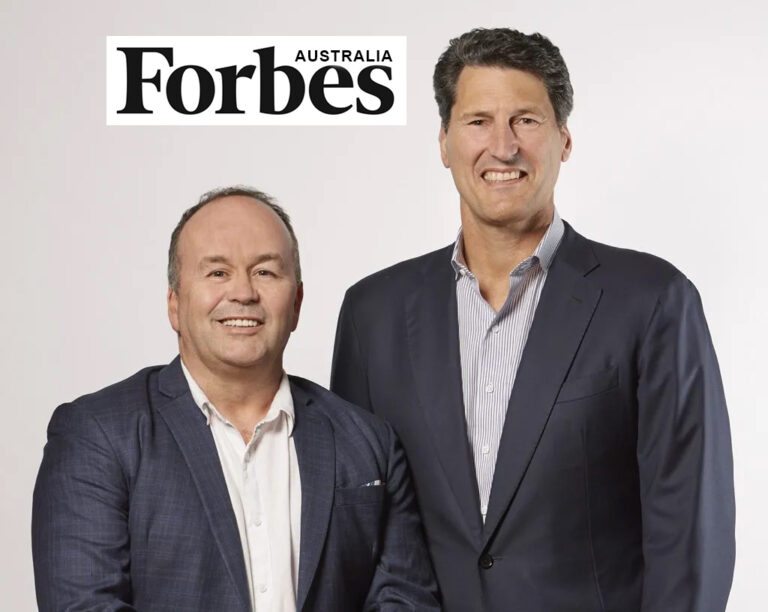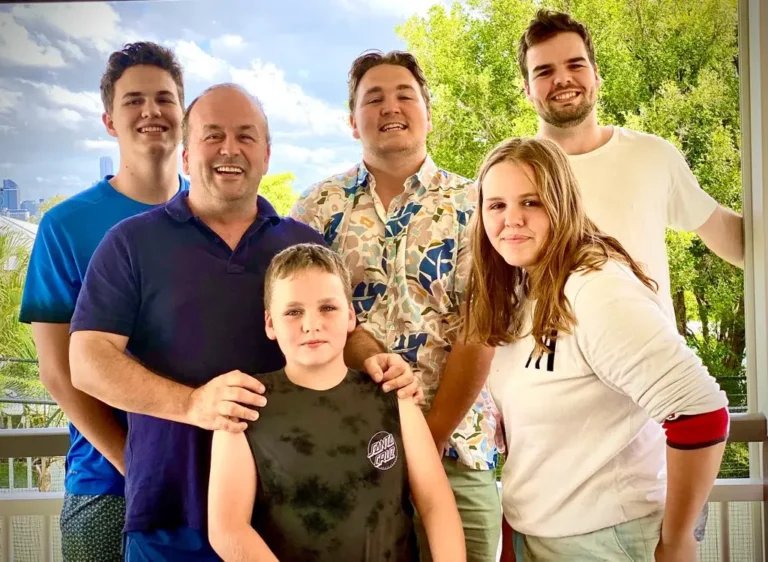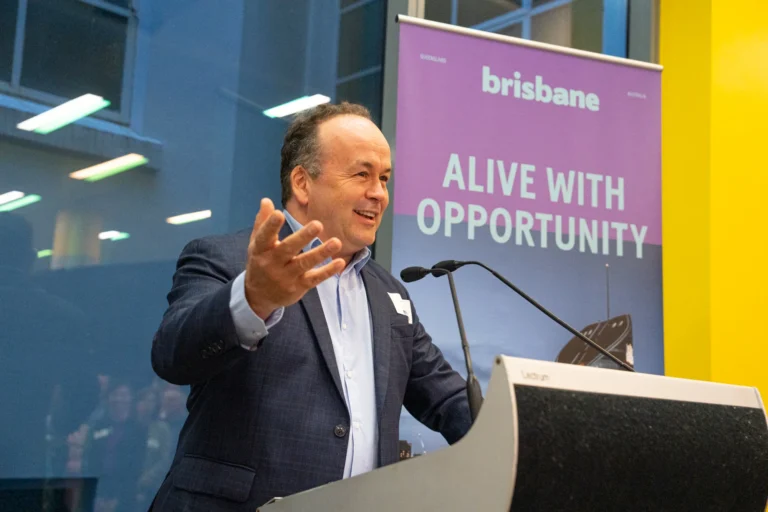Forbes magazine features DMC founder – how Professor John Fraser aims to ensure that through innovation, patients thrive, not just survive
WEDNESDAY 06 MARCH, 2024

Professor John Fraser’s Belfast born grandmother was one of the first women to qualify in Northern Ireland as a doctor. It was the 1900s, and she was there to rebel, to change outcomes and to prove that women could do just as well as men. She did so emphatically when she boldly established one of the first field hospitals at the 1916 Easter Uprising against the English at the Dublin post office.
It was her early influence that instilled in her grandson a lifelong passion to ensure he left the medical world better than he found it, never accepting the mantra “but we have always done it that way”. And while the many facets of Fraser’s career are diverse, they’re all bound by that single ethos.
Fraser is the holder of five professorships across Australia’s elite universities, the founder and director of the Critical Care Research Group and inventor of De Motu Cordis a smart inhaler of adrenaline that will provide a ” breath of life” for sufferers of life threatening allergic reaction, and the co-founder with Daniel Timms, the inventor, of BiVACOR (a wholly artificial heart). He is refreshingly self-deprecating about his numerous achievements – a trait native to his east end of Glasgow upbringing and heightened (he says) by his five wonderfully honest and direct children.

Growing up as the youngest child in a family of strong personalities, Fraser reveals how his brother, a GP, was always perceived as the “real doctor”, with his Tweed jacket, timed lunch breaks and tidy tartan tie. While his sister, an artist, was viewed by their English Literary lecturer father as the true family scholar.
It was only when his father lay dying, ventilated in the ICU from lung failure, that Fraser perhaps recognised and realised that his “hobby” of unpaid research and innovation could become a game changer.
“When you’re a young gun in medicine, it’s all about the data and numbers. But when it’s someone in your own family, the lens changes and the view becomes much more real, more human,” he says. His father’s death gave him an understanding that “what we see as success is not always what the patient sees. A good death is just as important as a life saved”.
Fraser’s father was able to come home in his last days, “water the roses” and die peacefully surrounded by laughter and his loved ones. He was given space and autonomy – a death full of dignity, not unnecessary distress.
The Critical Care Research Group
Years later, Fraser “acquired” half an office, which became the birthplace of The Critical Care Research Group, whose goal right from the outset was “patient, not the practitioner”. From this humble abode, it has now grown to 8 purpose-built labs in Brisbane with sister labs across the globe – but in each of them, no matter location, the heart of the matter is always the patient’s best outcome.
“It became so exciting –the best and brightest from science, engineering, allied health and medicine, all coming together with the one purpose of making today’s research into tomorrow’s treatment,” says Fraser.
He realised, just as with his beloved football, that an outstanding team can achieve so much more than an individual in terms of treatment, diagnosis, and then new devices.
The Group has since spearheaded a range of vital initiatives, including the world-first ICU of the Future; a redesigned Intensive Care Unit Focused on survival, but equally on also the quality of that survival, one free from the debilitating effects of delirium and PTSD.
When the COVID-19 pandemic struck the global power of CCRG, which had quietly grown over the preceding 18 years, shone. “As a researcher, the best way to deal with an unknown global problem is to gather truly global data,” says Fraser, “and to achieve that, we assembled a global network – the Covid Consortium”.
What ensued was ground-breaking.
“Together, with co-founders Jacky Suen and Gianluigi Li Bassi, we gathered I think 64 countries, 450+ hospitals and around 55 million data points”, Fraser explains. “We were able to show during a pandemic that whilst we couldn’t travel”, our data could. More importantly, this data answered questions that helped clinicians to learn and understand. The Consortium became a lifeline, a “safe space”, for the front–line doctors, allied health, and nurses during those dark days.
“As the world emerged from the chaos of the early pandemic and survival rates surged, thanks to effective vaccines, we received numerous heart felt emails from international leaders acknowledging that aside from the profound academic achievements, the global village meetings space that we had created on those Thursday consortium calls was perhaps just as meaningful.”
“They looked forward to being able to join space where they could laugh and cry with colleagues, and then share ideas and start to look at the data that they helped create. So that was a lovely thing to be able to help, not just patients and the doctor, but to be able to help our colleagues cope with what was a once in a lifetime, I hope, event”.
De Motu Cordis
Fraser’s interest in creating new technology and devices for the emergency treatment of life-threatening conditions was the impetus for his business venture, De Motu Cordis (DMC).
Identifying that adrenaline remains the only drug that makes survival possible for cardiac arrest, Fraser was determined to provide an easier method of resuscitation and improve outcomes for survivors by minimising the duration that they experience oxygen deprivation while their heart’s stopped.
The seed of the idea was planted following the poor outcome of a colleague who survived cardiac arrest, but had severe brain injury, caused by delay of blood to the brain.
“I thought how can we get lifesaving drugs in more quickly than having to wait for the hospital to come to the patient? And it occurred to me obviously, that the lungs are brilliantly adapted for drug delivery, Fraser explains. “And the quicker drug delivery is administered, the less likely it is for a patient to suffer brain damage.”
Fraser again brought together a talented team who soon identified that the same method could be applied to those experiencing life threatening allergy, or anaphylaxis. De Motu Cordis focused on the development of a needle-free smart inhaler that utilised the body’s entire blood flow through the lungs to rapidly deliver adrenaline outside of a clinical setting.
“Medics need to work with industry to get the technology better to make patient outcomes better,” Fraser puts it simply. “So that’ll be firstly anaphylaxis, and then we’ll look at cardiac arrest. We will create a ‘fit for purpose’ device for cardiac arrest, but it will be the same drug. The American Heart Association says if you can reduce morbidity by 10%, it’s a $75 billion saving for the community. That’s making survival worthwhile.”
The technology is backed by former Australian rugby great, John Eales who whole heartedly accepted Fraser’s offer to him as the chair of De Motu Cordis. He is ably assisted by television’s “Shark Tank” Glen Richards, as a director.
“Big John is not only an outstanding guy, but a strong and insightful leader. And, bizarrely, the combination of one of the world’s best rugby players and me, the worst ever football player, has evolved into a very balanced and successful ‘Ying and Yang’” Fraser jokes.
The Brisbane Economic Development Agency

Earlier this year, Professor Fraser was announced as the inaugural global MedTech ambassador for the Brisbane Economic Develop Agency and will spearhead Brisbane’s global reputation for medical innovation.
While private investment has been forthcoming, Fraser notes the frustrating reality of trying to get substantial government buy-in, suggesting that “Australia doesn’t back scientists enough. We talk of ‘R & D’ – research and development. Australia punches well above her weight in the ‘R’ but falls miserably at the ‘D’, meaning we lose some of the best scientists and that delays the growth of today’s research being tomorrow’s treatment”, Fraser says.
“For every dollar spent in research, society reaps around $7 return. But it’s not sexy. It’s not rugby.
If you go to Asia or the USA, funding is so much easier to attain, and the opportunities are much more visible. I think there’s a reticence from government to invest here. And I think that’s crazy. When we look at COVID, it was the science of vaccines, public health, and data analysis that put the world back on its axis”.
What’s next?
Where Fraser finds capacity for the numerous projects, innovations, collaborations, and research he remains firmly absorbed in, is a mystery. As a father of five to top it off, I ask him if he ever feels like he’s stretched too thin.
“I only dream of being too thin”, he jokes.
While he notes that sitting by the water is a personal stress tonic and approach to self-care, he cheekily accepts the “Willy Wonka of the Ward” name that colleagues have baptised him with.
“I am so lucky to be supported and inspired by numerous people from numerous fields in numerous countries. It doesn’t matter the accent or colour or country, we are all working for the same purpose: to do better for our patients and create tomorrow’s treatment together”, he says.
In terms of his ultimate aspiration, and the mark he hopes to leave, the goal is clear:
“I would like to train another generation of clinician scientists and build bridges, not walls between engineers and clinicians and scientists, bringing the best and brightest to Australia”, he says.
“I’d love to normalise the idea that doctors, allied health, nurses, and scientists, we look at treatments and solutions it from a patient’s perspective, They are the key – not us”.
Fraser also draws from the wisdom of a poem bestowed by his mentor Dr John McCarthy and penned by Ralph Waldo Emerson. Sitting framed on his desk, it reads:
To leave the world a bit better, whether by a healthy child, a garden patch, or a redeemed social condition.
To know that one life has breathed easier because you have lived.
This is to have succeeded.
“If I can do this, I think my dad and my grandma would approve. That would be success,” says Fraser.
Read the article on Forbes here
